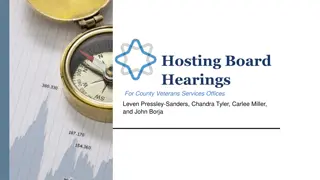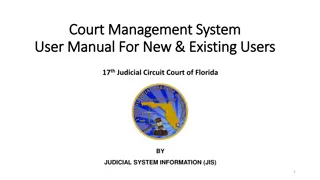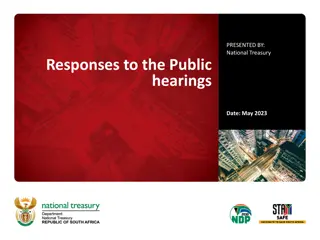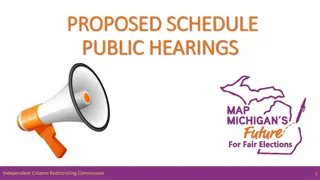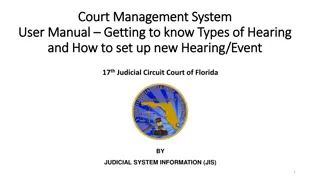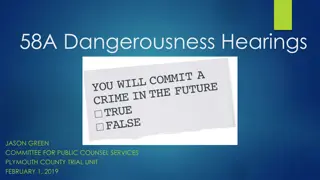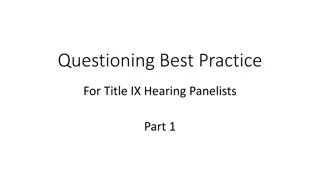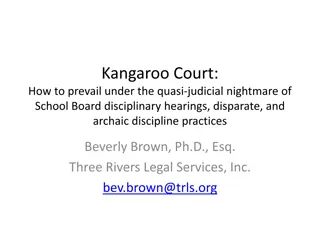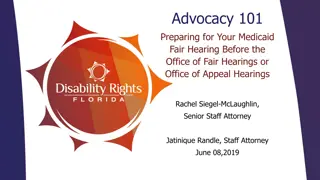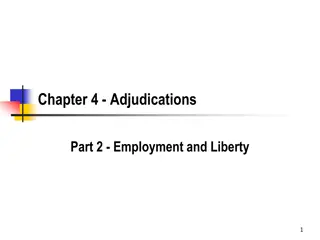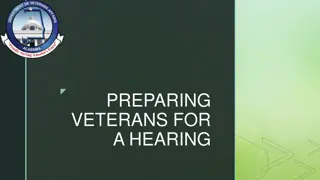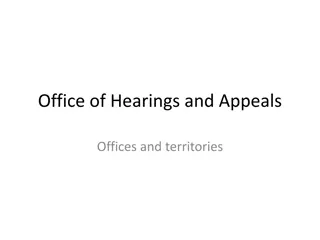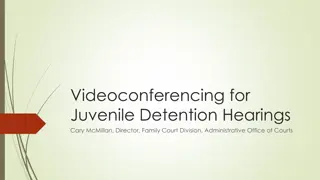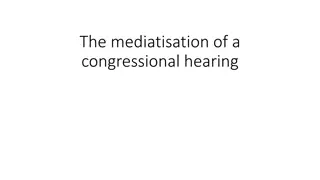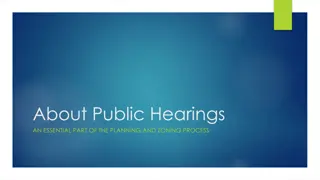Essential Strategies for Effective Preliminary Hearings
Learn the key themes and strategies for effective preparation for preliminary hearings in legal cases. Explore the importance of intentional preparation, requesting subpoenas, handling discovery requests, and making strategic decisions to achieve specific goals. Gather materials, be aggressive with Brady requests, and focus on goal-oriented planning for success in preliminary hearings.
Download Presentation

Please find below an Image/Link to download the presentation.
The content on the website is provided AS IS for your information and personal use only. It may not be sold, licensed, or shared on other websites without obtaining consent from the author.If you encounter any issues during the download, it is possible that the publisher has removed the file from their server.
You are allowed to download the files provided on this website for personal or commercial use, subject to the condition that they are used lawfully. All files are the property of their respective owners.
The content on the website is provided AS IS for your information and personal use only. It may not be sold, licensed, or shared on other websites without obtaining consent from the author.
E N D
Presentation Transcript
THEMES Preliminary hearings are important hearings Cannot prep last minute Prep as if this is your last opportunity to probe Everything should be a product of a strategic choice or decision Show intentionality of Brady suppression Be aggressive with discovery and Brady requests
DISCLAIMER In every case, there may be a strategic reason not to do something discussed during this training. We are not discouraging strategic choices. In fact, every question should be the product of some strategic choice or decision you made.
SUBPOENAS / REQUESTS Brown Motion for DCFEMS and Hospital Records OCME for Autopsy, Photographs, & Toxicology Results OUC Recordings OPC for all officers involved in investigation (officer credibility)
DISCOVERY REQUESTS Client s statements Surveillance footage referenced in Gerstein/affidavit Brady requests that are apparent from Gerstein/affidavit (source documentation) Brady request for decedent s prior acts of violence Jencks in advance (consider continuance) File initial Rosser letter
GATHER MATERIALS Please do not only use Gerstein and AWA to draft your Qs Gerstein & Arrest Warrant Affidavit Jencks Client s statement Surveillance footage Defense statements, memos, and investigation Complainant and decedent s closed and pending cases
PRODUCT OF STRATEGIC DECISIONS Be Goal-Oriented, Have a Plan Set 3 Specific Goals No Broad Goals Specific Goals Identify factors that make W1 s account more credible than W2 s account Identify whether W1 could have gotten his information from W2 Figure out whether W1 is likely the addict who stays across the street from the incident
THE DRAFTING PHASE: STEP 1 Just the beginning Fleshing out the information contained in the Gerstein and AWA Must go line by line Should take you several hours to draft questions Give yourself multiple days to draft to be able to revisit the materials and Qs with fresh eyes
THE DRAFTING PHASE: STEP 2 Now we are getting serious Getting to the investigative decisions made and the grounds for those decisions
THE DRAFTING PHASE: STEP 2 Examples Why was client a person of interest and/or developed as a suspect? When was client developed as a suspect? Why did you decide not to attempt an ID with W1? What investigation did MPD do to rule Winfield out/why ruled out? How did MPD go about determining which version of W1 s account to credit? Why was W1 interviewed a second time/multiple times?
THE DRAFTING PHASE: STEP 3 This is where the money is at Getting to the Brady and information NOT contained in the Gerstein and AWA Example How many people stopped based on description?
THE DRAFTING PHASE: STEP 3 THOUGHT PROCESS: Every assertion made by the government will be made in the most inculpatory way that the evidence permits them to make it Look for the omissions Did they not mention that client fit the description? Did they mention that the witness made an identification? Did they mention a motive? Did they mention the caliber of the shell casings and the recovered firearm? Did they mention that all the shell casings were fired from one gun? Did they mention that the ballistics was a match for the shell casings and weapon recovered?
THE DRAFTING PHASE: WITNESS QUESTIONS Go to scene to see where obstructions are located Start with framing question W2 is not an EW Have to figure out Number of interviews (do not assume the number is reflected in Gerstein/AWA) Who present for interview Scope of information provided during each interview Did witness add new information that was omitted from other interviews Did witness change accounts in any interview Anything inconsistent between/among interviews
THE DRAFTING PHASE: WITNESS QUESTIONS Under arrest, in custody, who initiated contact for each interview Professional/working relationship with MPD or USAO Provided untruthful statements to MPD or USAO in past (look to past or pending cases) Under the influence When observing incident, when interviewed, when testified Be broad anything MPD observed or learned during investigation that lead MPD to believe Did you ask witness about whether he or she was using or had a drug problem Habitual user If at hospital, had been administered medication Mental Health Vision Problems Any attempts to evade or not speak to police Shown any evidence during investigation
THE DRAFTING PHASE: WITNESS QUESTIONS Don t forget the wrap-up questions Anything witness said that turned out not to be true Whether witness provided any information that was contradicted by other witnesses Whether witness provided any information that was at odds with other evidence obtained during investigation
THE DRAFTING PHASE: CLIENT Demeanor questions when not captured on BWC Questions based on client s statement No flight When do not recover gun bring gun dogs, canvass, search home No physical or forensic evidence linking client to incident
THE DRAFTING PHASE Structure and order matters Treat like a direct or a cross, judges like to be entertained too Avoid starting with the Jencks inquiry Be goal-oriented Frame the case the way you want the judge to process the case/witnesses Makes the prelim feel less like a discovery-expedition
THE DRAFTING PHASE Brainstorm anticipated objections Brainstorm your responses and reasons to approach ex parte
BEFORE THE HEARING Rule on Witnesses Napue and Brady Obligations for GJ Testimony
DURING THE HEARING: JENCKS INQUIRY Reports, notes, BWC, emails, texts, voicemails, etc. Drafts or changes to the Gerstein/affidavit Materials officer authored as well as materials he reviewed to prepare for hearing Set deadline for materials not provided like BWC Type name of report and number of pages for each report provided For the case update logs, number the pages on the back of the page Have witness read handwritten notes and explain on stand
DURING THE HEARING Be comfortable straying away from script, but make sure to come back Do not let witness control direction of examination Do not waste a lot of time on things you will get in discovery Avoid objections Be strategic with objection responses
DURING THE HEARING: MARK UP DOCUMENTS Orient judge to location Use to mark flight path and relevant locations Clearly mark using different colors and different shapes Ask judge to take and make a copy for chambers Take a picture and email all parties
DURING THE HEARING What did the detective review and do to prepare for PH I don t know or recall , anything you can review that contains the answer When witness pauses, hesitates, or looks to the government When govt objects, makes ex parte proffer, and objection sustained When witness says he never received any information about X, make sure to ask whether he ever inquired about X
DURING THE HEARING When witness keeps answering I don t know Have trial chapter Swore out warrant Had somebody arrested As lead detective did not know all this information
DURING THE HEARING: IMPEACHMENTS General Rule: Avoid Impeachments Exceptions Beat PC Get client released



